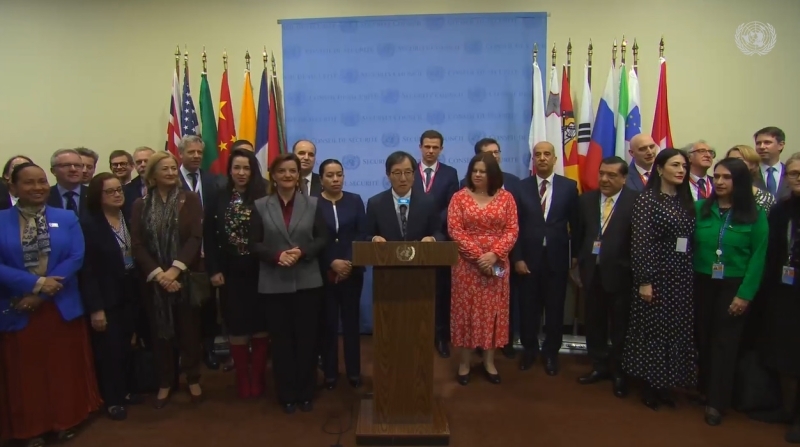安保理公開討論「紛争予防の推進-女性及び若者を含む全てのアクターのエンパワーメント」後の山﨑大使による67か国共同プレスステークアウト
令和6年3月13日

(As delivered)
We, Albania, Australia, Austria, Belgium, Bosnia and Herzegovina, Brazil, Bulgaria, Cambodia, Canada, Chile, Colombia, Costa Rica, Croatia, Czechia, Cyprus, Denmark, Ecuador, Egypt, Finland, France, Germany, Ghana, Greece, Guatemala, Guyana, Hungary, Italy, Kenya, Latvia, Liberia, Lithuania, Luxemburg, Malta, Moldova, Montenegro, Morocco, Mozambique, Myanmar, Netherlands, New Zealand, North Macedonia, Norway, Panama, Peru, Poland, Portugal, Qatar, Republic of Korea, Romania, Rwanda, Saudi Arabia, Sierra Leone, Slovenia, South Sudan, Spain, Sweden, Switzerland, Timor-Leste, Tonga, Türkiye, UAE, Uganda, Ukraine, United Kingdom, United States, Uruguay, and Japan reaffirm our strong commitment to prevention, peacebuilding and sustaining peace.
The world can avoid the human tragedy and devastating consequences of conflicts when we concentrate on preventing them from erupting, preventing their escalation and spread once when they do occur, and preventing their recurrence once they have ended. This is also significantly more cost-effective, considering the political, socio-economic, and financial costs.
Effective and collective prevention is needed to save succeeding generations from the scourge of war, as envisioned in the UN Charter.
The Security Council needs to proceed with and fulfill its determination to enhance the effectiveness of the UN in preventing armed conflicts.
With this in mind, the Security Council, under Japan’s presidency, convened the open debate today to hear ideas from all Member States on the role that the Security Council is expected to play in supporting nationally led efforts in prevention. More than 80 countries and groups have inscribed to speak.
During the debate this morning, the importance of conflict prevention was reiterated by the briefers and Member States. They also affirmed the need for a comprehensive approach based on national ownership, to prevent conflicts, and address local needs and the root causes.
For such a comprehensive approach, the relevant UN bodies and agencies would need to collaborate, and all members of society engaged in the peacebuilding and conflict prevention efforts.
Concrete proposals were made today, including the utilization of the myriad of Security Council tools, close cooperation between the Council and other agencies, and leveraging the use of the Peacebuilding Commission (PBC).
We hereby commit to working together as responsible Member States to effectively incorporate proposals and recommendations made by various countries and regions into the Council’s activities to further promote conflict prevention.
We also call upon Member States to further advance discussions and actions towards the Summit of the Future and the 2025 Review of Peacebuilding Architecture and encourage them to promote conflict prevention from their own perspectives and areas of expertise.
Today’s Debate showed the collective commitment of Member States to do our utmost to promote conflict prevention.
